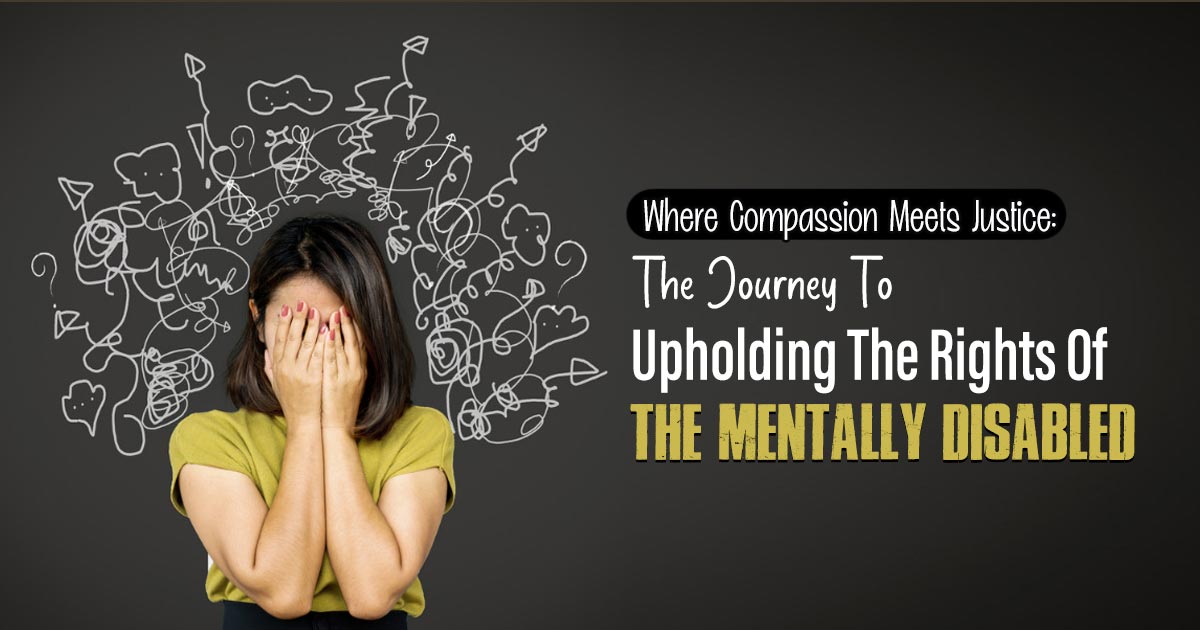Mental health disability is a term used to represent a variety of mental health conditions that affect a person’s ability to think, feel and act. These neuro-developmental disorders like schizophrenia or anxiety can be seriously disruptive to people’s everyday life roles, their relationships, and their ability to function in general. One should acknowledge that just as physical disabilities require understanding and support, mental health disabilities represent genuine health problems and a violation of rights of people with mental health disability.
Stigmatization Of People With Mental Health Disability
Stigmatization and social ostracization affect people with mental health disability, thereby worsening their situations. Society usually engages in stigmatizing those with mental illnesses based on misconceptions and prejudices related to disability. This stigma comes in various forms, such as negative language use, discriminatory practices, as well as maintaining stereotypes harmful to them.
For instance, one common myth is that persons with mental health disabilities are incompetent or unreliable compared to neuro-typical persons. With no facts supporting it; this claim ends up causing its victims’ social isolation due to strained relations with others around them. Also, it denies them job opportunities, preventing their full integration into society and denying them the availability of necessary provisions.
What Are The Rights Of People With Mental Health Disability?
The rights of people with mental health disability are premised on principles of equality, dignity, and non-discrimination among others. Many international as well as national organizations have recognized these rights, ensuring that they live respectful self-governing lives with the required resources and support systems. The key rights of people with mental health disabilities include:
1. Right To Equality:
People with mental health disabilities have the right to be treated in a way that is respectful and dignified, like everyone else. This entails equal opportunities for education, employment and participation in community activities.
2. Right To Privacy:
People with mental health disabilities have the right to discreetly approach their disabilities. It is their right, like any other person who has gotten a mental illness diagnosis, not to have their health information given out without their consent. In fact, any mental condition should not be used against them to guilt-trip them into feeling helpless.
3. Right To Access Healthcare:
One of the fundamental human rights for individuals with mental health disabilities involves their entitlement to adequate and accessible healthcare. This means that they must receive appropriate treatment options, medication, as well as support services without prejudice or discrimination.
4. Right To Work:
Any person with mental health disability is allowed to engage in any occupation, like people with mental challenges. To this effect, any discrimination on employment based on one’s mental health disability status goes against this right.
Are The Rights Of People With Mental Health Disability Respected?
Despite these legal provisions, the rights of people with mental health disability are seldom respected and discrimination persists. There is social stigma attached to it and the access towards mental health care services remains wanting.
Mental health disability biases also exist in the workplace, affecting hiring, promotion and advancement. This practice of discrimination not only restricts economic opportunities for people with such disabilities but also strengthens the existing stereotypes.
Additionally, criminal justice systems across the globe may be ill-equipped to handle people with mental health disability issues, exposing them to unfair treatment. Instead of providing care and support they need, many are found in prisons, which worsen their mental health conditions.
Why Do We Need To Protect The Rights Of People With Mental Health Disability?
The matter of upholding the rights of persons with mental health disabilities goes beyond mere legality; it is about building a fair world that includes everyone. Firstly, protecting their rights means enabling them to enjoy good mental health. They require access to healthcare facilities as well as educational opportunities so that they can live better lives contributing positively towards development.
Secondly, creating an inclusive society where mentally disabled persons’ rights are respected means embracing diversity and breaking down stigmatization. This creates a compassionate community that understands one another and erodes social differences.
Protecting The Rights Of People With Mental Health Disability
Effectively protecting the rights of people with mental health disability requires coordinated action at individual, societal and institutional levels:
1. Education And Awareness:
It is important to promote education as well as awareness regarding mental health disability, so as to debunk myths associated with it while reducing its stigma. In doing so, we foster an understanding of various human experiences, thereby promoting more compassionate societies.
2. Legal Reforms:
This involves strengthening legal frameworks against violation of the rights of individuals with mental health disabilities. Accordingly, these include tackling employment discrimination, healthcare access, and reforming the criminal justice system to suit their unique needs.
3. Mental Health Support Services:
This should involve ensuring adequate mental health support services for people with mental health disability and doing away with stigmatization.
4. Workplace Inclusion:
Employers are essential in creating an inclusive workplace. This entails having mental health as a priority in the workplaces, offering reasonable accommodations and training employees on diversity and inclusion.Protecting the rights of people with mental health disability requires understanding and empathetic actions towards this goal.
This can be achieved by dispelling myths, introducing proper legal protections, and encouraging inclusion as a cultural norm in order to create a society that respects everyone’s rights. By doing so, we can help people with mental disabilities live a better life, as well as foster compassion, equality, and awareness.



